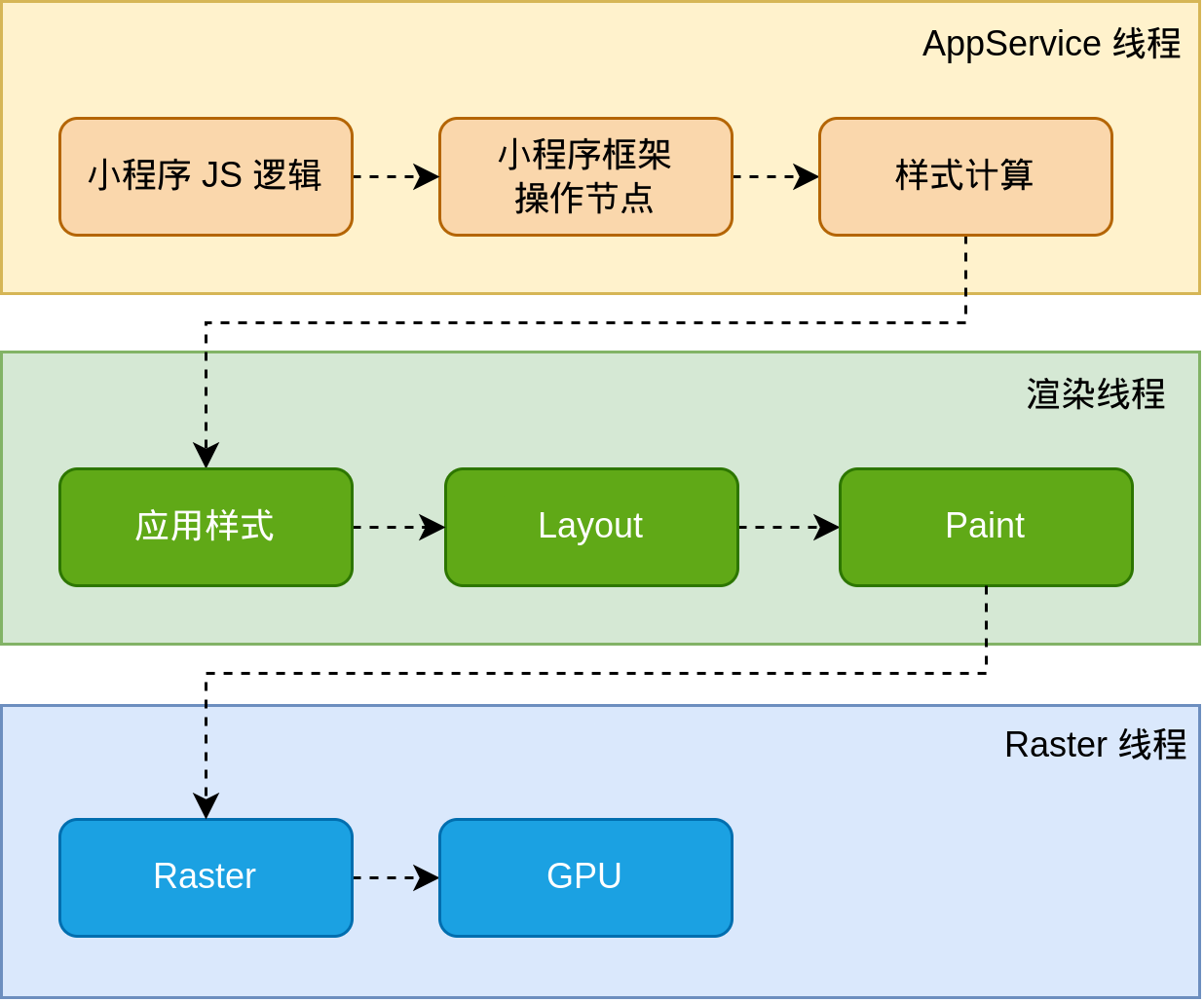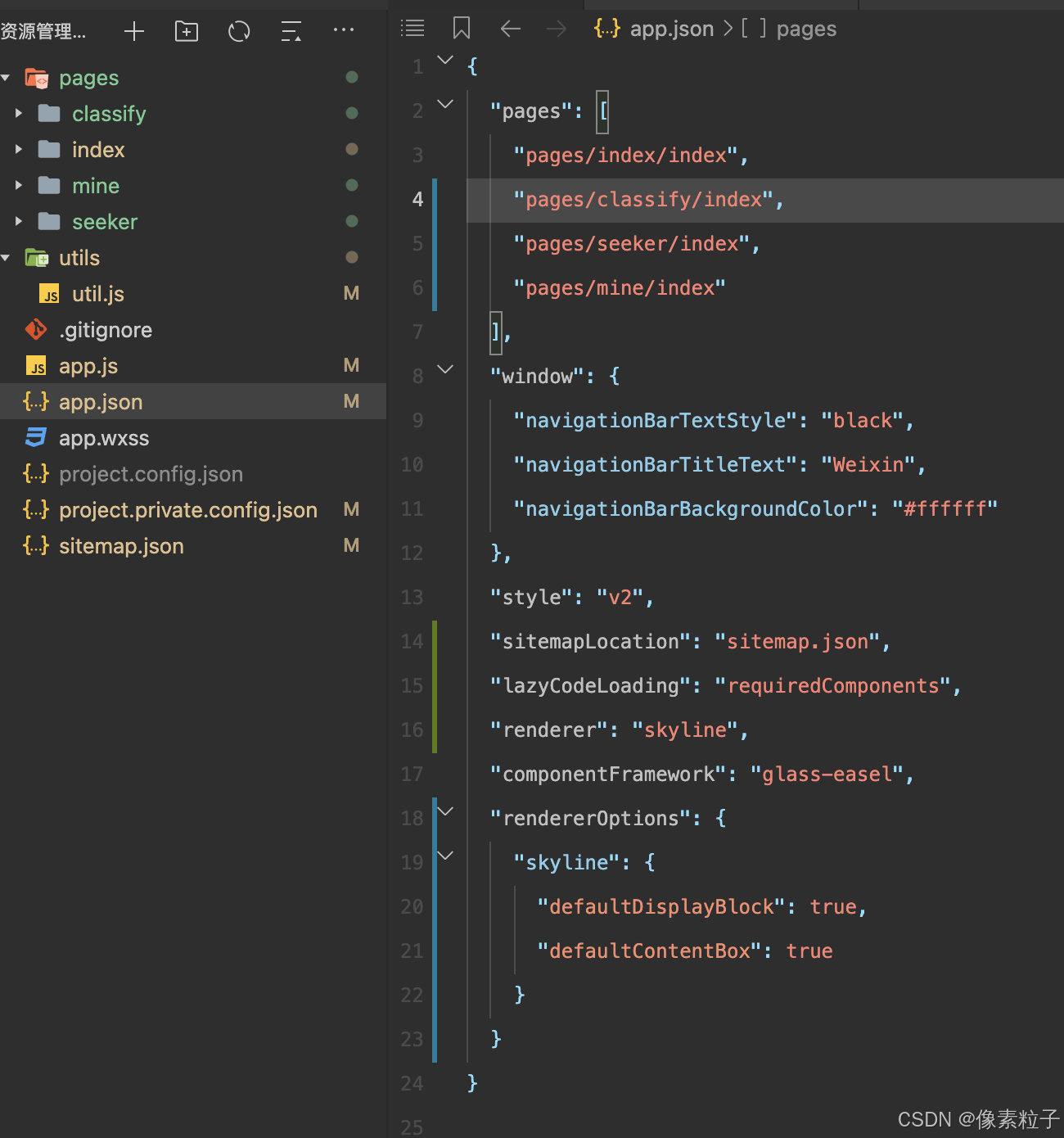微信小程序 最新推出的Skyline渲染以及打包ios、andorid查看各个技术平台很少有详细介绍与项目案例,下面是一个简单的壁纸项目开发实战案例,涵盖了从项目创建到功能实现的整个过程。
项目概述
我们开发的是一个小程序手机、平板、pc端壁纸项目。用户可以点赞、收藏、下载壁纸。虽然项目很简单,但项目中我们会涉及多语言、主题外观、适配ios andorid、手势系统、自定义tabbar、自定义appbar、复杂组件开发测试、自定义路由、 元素共享动画、以及一些算法如:发布订阅、线性插值、矩形插值等高阶内容。
项目初始化
首先你需要拥有微信小程序AppID,以及下载微信开发者工具,再打开微信开发者工具创建一个不使用微信云以及官方JS-基础模版的小程序,这里我们就不再细聊,我们默认用户拥有一定开发基础。
编译项目后能正常运行。接下来需要配置Skline,打开app.json配置文件,添加如下配置。
"renderer": "skyline",
"componentFramework": "glass-easel",
"rendererOptions": {
"skyline": {
"defaultDisplayBlock": true,
"defaultContentBox": true
}
},再点击微信开发者工具右侧详情-本地设置勾选开启Skyline渲染调试,以及将JS编译成ES5。当然如果你还需要真机调试,需要在真机下点击小程序胶囊-开发调试-Siwtch Render 选择Skline。
创建项目配置skyline
获取微信小程序基本布局信息以及系统基本信息
打开 app.js文件先删除部分内容只留下基本的框架 留下如下代码
App({
onLaunch() {
this.globalData = {
appName: '多时壁纸', // app名称
windowInfo: null, // 设备布局与APP基础信息
}
}
})
获取基本信息
// 获取窗口信息
const windowInfo = wx.getWindowInfo()
// 获取设备基础信息
windowInfo.deviceInfo = wx.getDeviceInfo()
// 获取菜单按钮(右上角胶囊按钮)的布局位置信息。坐标信息以屏幕左上角为原点。
windowInfo.clientRect = wx.getMenuButtonBoundingClientRect()
// APP基础信息
windowInfo.appBase = wx.getAppBaseInfo()
// 计算appbar高度
windowInfo.appbarHeight = windowInfo.clientRect.bottom + windowInfo.clientRect.top - windowInfo.statusBarHeight
// 计算胶囊边距
windowInfo.padding = windowInfo.windowWidth - windowInfo.clientRect.right
// 计算头部导行高度
windowInfo.headerHeight = windowInfo.appbarHeight - windowInfo.statusBarHeight
// 设备宽高比例
windowInfo.ratio = windowInfo.screenWidth / windowInfo.screenHeight
// 加入全局数据
this.globalData.windowInfo = windowInfo获取设备信息
自定义tabbar
我们还是先删除掉没用的页面以及内容和utils文件夹子下utils.js里面的全部内容。删除pages文件夹下的全部文件夹,以及删除app.json下pages下的配置。再再pages文件夹下创建四个文件夹分别是:index、classify、seeker、mine。 注意我们在这四个文件下创建的是组件components而不是页面page,app.jaon中pages[]和普通的配置一样。
现在文件目录应该是这个样子的,而四个页面index.js内容是如下代码:
const app = getApp()
Component({
behaviors: [],
properties: {},
observers: {},
data: {},
lifetimes: {
created: function () {},
attached: function () {
},
ready: function () {},
detached: function () {}
},
pageLifetimes: {
show: function () {},
hide: function () {}
},
methods: {}
})pages文件夹下index.json配置如下,四个都一样哈。
{
"navigationStyle": "custom",
"navigationBarTextStyle": "black",
"disableScroll": true,
"componentFramework": "glass-easel",
"renderer": "skyline",
"component": true,
"usingComponents": {}
}好了现在对应的tabbap四个页面都创建完成,自己为每个页面添加个背景色,一会切换测试看得清楚些。
在根目录下创建存放静态资源的status文件夹, 图片请下载原码。再在根目录下创建一个custom-tab-bar文件夹以及在文件下创建index组件。这就是我们需要自定义的tabbar布局组件。当然你还是需要配置一下app.json 下的 tabBar。
"tabBar": {
"custom": true,
"list": [
{
"pagePath": "pages/index/index"
},
{
"pagePath": "pages/classify/index"
},
{
"pagePath": "pages/seeker/index"
},
{
"pagePath": "pages/mine/index"
}
]
}开始编写自定义tabbar:
const { runOnJS, shared, timing, Easing, spring, sequence } = wx.worklet
const app = getApp()
const wininfo = app.globalData.windowInfo // 基础信息
Component({
options: {
addGlobalClass: true // 使用全局样式
},
lifetimes: {
attached: function () {
// wx.worklet.shared用于跨线程共享数据和驱动动画数据
// Y抽偏移距离
this._offsetY = shared(100)
// 主题颜色
this._backgroundColor1 = shared(app.globalData.theme === 'light' ? '#f4e2d8a6' : 'rgba(0,0,0,0.3)')
this._backgroundColor2 = shared(app.globalData.theme === 'light' ? '#f4e2d82d' : 'rgba(0,0,0,0.3)')
// 获取组件节点更新属性
this.applyAnimatedStyle('#tabbar', () => {
'worklet'
return {
transform: `translateY(${this._offsetY.value}px)`,
background: `linear-gradient(145deg, ${this._backgroundColor1.value}, ${this._backgroundColor2.value})`
}
})
},
},
ready() {
this._offsetY.value = spring(0)
},
data: {
index: 0,
list: [
'../static/index',
'../static/classify',
'../static/seeker',
'../static/mine'
]
},
methods: {
// 显示隐藏
onShowHide(bool = true, defaultNumber = 0, hideNumber = 100) {
if (bool) this._offsetY.value = spring(defaultNumber)
else this._offsetY.value = spring(hideNumber)
},
// 切换背景颜色
switchBackgroundColor(theme = app.globalData.theme) {
if (theme === 'light') {
this._backgroundColor1.value = '#f4e2d8a6'
this._backgroundColor2.value = '#f4e2d8a6'
} else {
this._backgroundColor1.value = 'rgba(0,0,0,0.3)'
this._backgroundColor2.value = 'rgba(0,0,0,0.3)'
}
},
// 根据下标获取相应的页面
currentIndexGetPage(index) {
switch (index) {
case 0:
return '/pages/index/index'
case 1:
return '/pages/classify/index'
case 2:
return '/pages/seeker/index'
case 3:
return '/pages/mine/index'
default:
return '/pages/index/index'
}
},
// 切换页面
switchTab(e) {
// 重复中一个同一个tabbar处理
if (this.data.index === e.currentTarget.dataset.index) {
// 当不是探索直接返回
if (e.currentTarget.dataset.index !== 2) return
// 当在探索时发布下载事件
const eventChannel = this.getOpenerEventChannel()
if (!eventChannel) return
eventChannel.emit('download', { index: e.currentTarget.dataset.index })
}
// 当前点击下标
const index = +e.currentTarget.dataset.index
// 根据下标选择路由路径
let url = this.currentIndexGetPage(index)
// 跳转到 tabBar 页面,并关闭其他所有非 tabBar 页面
wx.switchTab({
url: `${url}?index=${index}`, // 路由路径
routeType: 'wx://cupertino-modal', // 路由类型
success: () => {
this.setData({ index }, () => {
// 短时间的振动
wx.vibrateShort({ type: 'medium' })
// tabbar在探索Y抽移动负40像素
if (index === 2) this._offsetY.value = spring(-40)
// 默认移动0
else this._offsetY.value = spring(0)
})
}
})
}
}
})<view id="tabbar">
<view wx:for="{{list}}" wx:for-index="i" wx:key="*this" bind:tap="switchTab" data-index="{{i}}">
<image src="{{item}}{{index == i? 1: 0}}.svg"/>
</view>
</view>#tabbar {
width: 600rpx;
height: 100rpx;
position: absolute;
left: 75rpx;
border-radius: 30rpx;
pointer-events: auto;
bottom: calc(env(safe-area-inset-bottom) + 8px);
backdrop-filter: blur(10rpx);
display: flex;
align-items: center;
}
#tabbar>view {
display: flex;
align-items: center;
justify-content: center;
flex: 1;
height: 100%;
}
#tabbar>view>image {
width: 50rpx;
height: 50rpx;
}自定义tabbat

